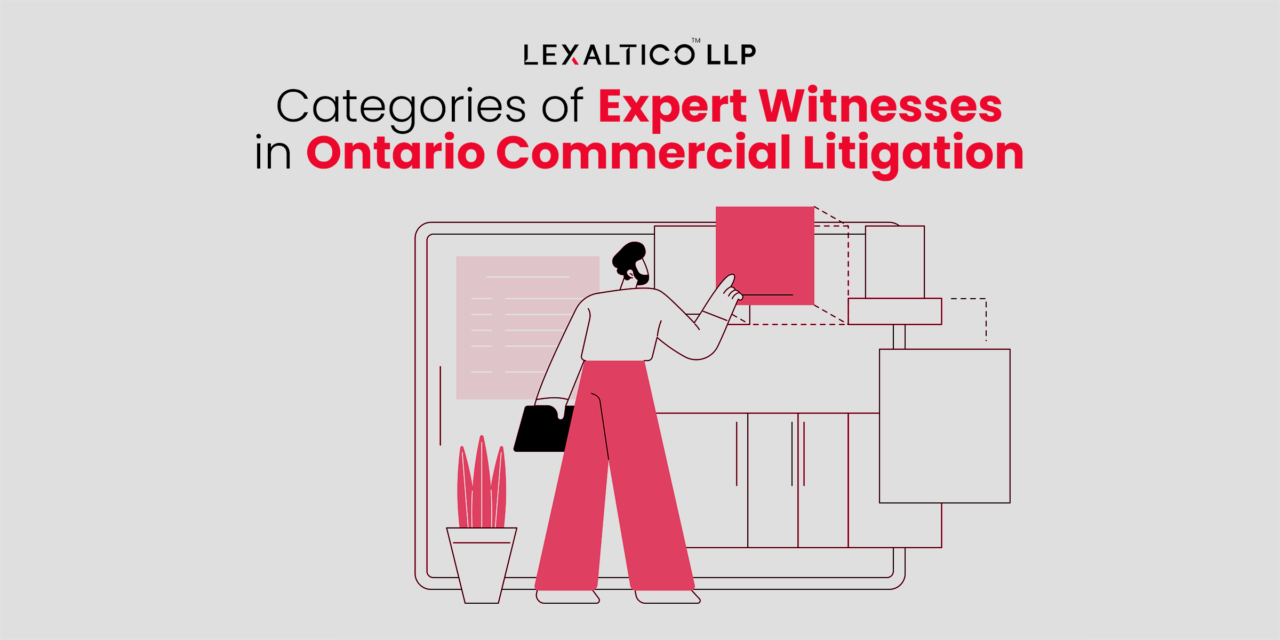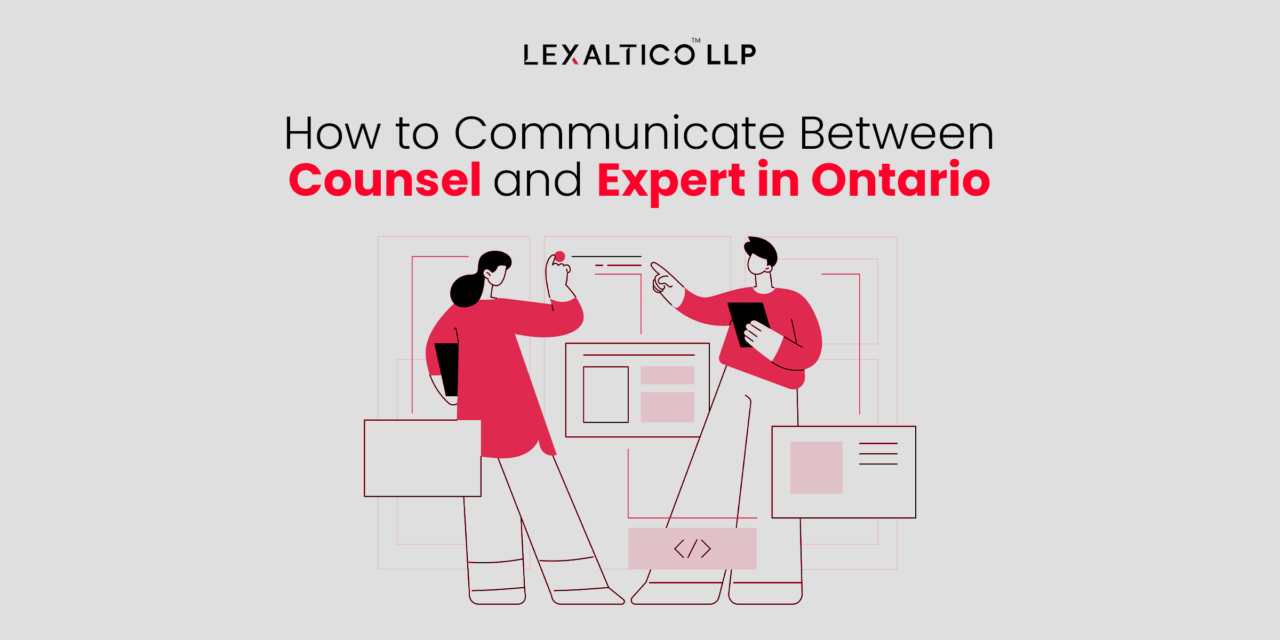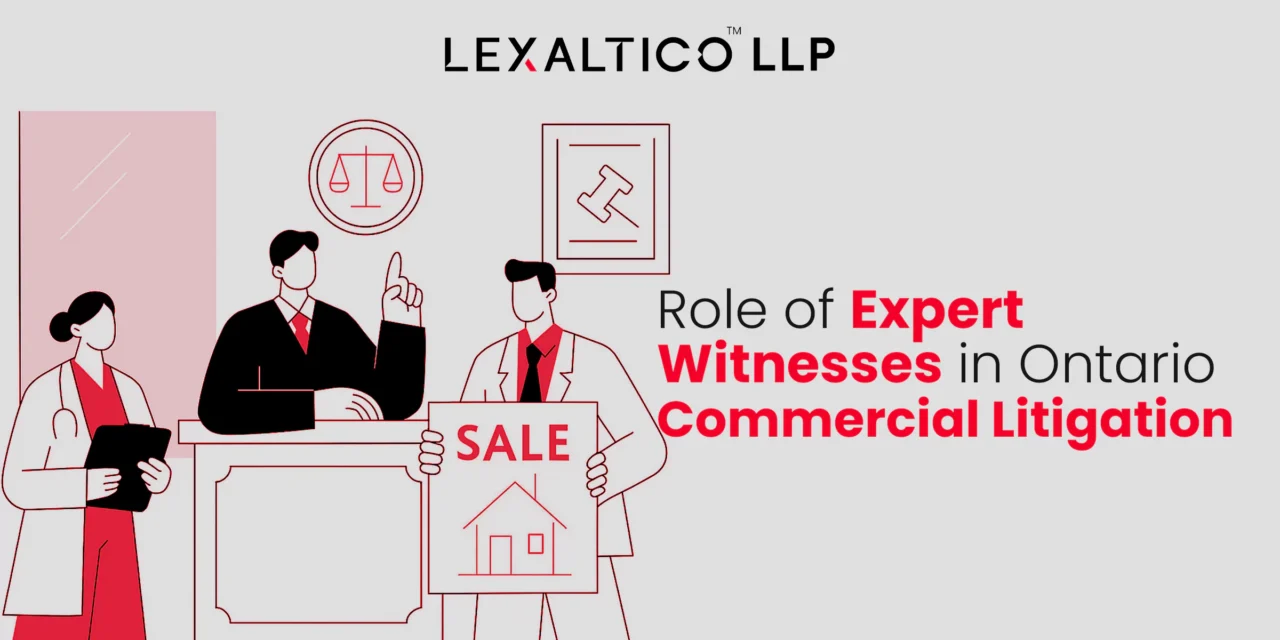Commercial lawsuits in Ontario often deal with issues that are too complex for judges or juries to understand on their own. These cases may involve money, engineering problems, or professional mistakes. Expert witnesses help by sharing special knowledge that explains the facts.
Normally, witnesses can only talk about what they saw or heard. Experts are different. They can give opinions based on training or experience. Courts depend on experts, but they also set strict rules. Experts must be fair, honest, and reliable.
This article looks at the role of experts in Ontario lawsuits, the rules for using them, and tips for working with experts.
Understanding Expert Evidence
Most opinion evidence is not allowed in court. A witness usually speaks only about facts they know firsthand. Expert evidence is the main exception. A qualified expert can give opinions that help the court understand technical matters.
The law accepts expert evidence when a judge or jury cannot make sense of an issue without it. But expert evidence must be helpful, not one-sided. Experts are there to explain, not to argue for one party.
Categories of Expert Witnesses

Ontario courts recognize three classes of expert witnesses: litigation experts, participant experts and non-party experts.
Litigation experts:
Litigation experts are retained by a party specifically to provide opinion evidence at trial. Because they are hired for the litigation, they must strictly comply with Rule 53.03 of the Rules of Civil Procedure. They must deliver a written report, sign an acknowledgment of duty (Form 53), and be available for cross-examination.
Participant experts:
Participant experts are witnesses whose expertise arises from their involvement in the underlying events, for example, a treating physician, police reconstructionist or engineer who investigated an accident.
The Ontario Court of Appeal in Westerhof v. Gee (Estate) held that participant experts may give opinion evidence for its truth without complying with Rule 53.03 when their opinion is based on observations made in the ordinary exercise of their professional duties. For example, a treating doctor can testify about diagnoses and prognoses formed during treatment.
Non-party experts:
Non-party experts are retained by a person or entity not directly involved in the litigation (e.g., insurers), and their opinions from work done in the ordinary course of duties are exempt from Rule 53.03. Like participant experts, non-party experts are exempt from Rule 53.03 when their opinion stems from work done in the ordinary course of their duties. If they intend to offer opinions beyond those derived from observations, they must comply with Rule 53.03.
Understanding these distinctions is essential because courts will exclude opinions from participant or non-party experts that go beyond the scope of their involvement unless a compliant report is served.
Legal Framework for Expert Evidence
Expert evidence in Ontario is controlled by rules and past court decisions. The two main sources are Rule 53.03 and the Supreme Court of Canada’s rulings in R. v. Mohan and White Burgess Langille Inman v. Abbott and Haliburton Co.
Rule 53.03
This rule applies to experts hired for a case. It requires them to serve reports on time and sign a duty form. Courts often direct parties to set an expert report schedule shortly after the trial is scheduled, but Rule 53.03 itself fixes the key deadlines at 90 and 60 days before the pre-trial. Reports served after the deadlines (90/60 days before the pre-trial) require leave of the court to be admitted.
The expert’s report must include:
- name, address, and field of expertise
- qualifications and work history
- instructions they received
- issues and questions
- their opinion and reasons
- assumptions, research, and documents relied on
- a signed duty form
These rules make sure everyone knows the basis for the expert’s opinion.
Mohan Test and Judge’s Role
The Mohan case set four conditions for expert evidence:
- It must be relevant.
- It must help the judge or jury.
- It must not break other rules.
- The expert must be properly qualified.
Judges must also weigh the value of the evidence against possible harm, like confusion. The White Burgess case added another rule: the expert must be independent and unbiased. Judges act as gatekeepers. They can block evidence that is weak, unfair, or confusing.
White Burgess: Duty of Impartiality
White Burgess emphasized that experts owe a duty to the court to provide “fair, objective and non-partisan” opinion evidence. An expert must be aware of this duty and willing and able to carry it out. If an expert cannot meet this threshold because they are unwilling to be impartial or have a direct financial interest in the outcome, their evidence should be excluded.
Once the threshold is met, remaining concerns about independence or bias will be weighed in the overall cost–benefit analysis.
The Court stressed three key concepts at the heart of the expert’s duty: impartiality, independence, and absence of bias. This duty underscores that experts are not advocates; their role is to assist the court, not the party that retains them.
Role of Expert Witnesses
The role of expert witnesses in Ontario is shaped by both the Rules of Civil Procedure and important court decisions. Together, these rules create strict duties designed to protect the fairness of the trial process and ensure that expert evidence is reliable.
- Independence and impartiality.
An expert witness must remain independent from the parties who hire them. Their opinions cannot be influenced by loyalty to a client or by personal interests in the outcome of the case. Independence means the expert’s testimony should stand on its own, supported by training, experience, and evidence, rather than by the wishes of the lawyers who retained them. - Form 53 acknowledgment.
Every expert retained for litigation must sign Form 53, a written acknowledgment of duty. By signing, the expert confirms that their first duty is to the court, not to the party who is paying their fees. This duty overrides any instructions from counsel or the desire to assist one side. It is a formal reminder that experts are there to help the judge or jury reach the truth, not to act as advocates. - Fairness and objectivity.
Expert witnesses must give evidence that is balanced, clear, and free of bias. Their role is to explain technical or specialized matters in a way the court can understand. To be credible, an expert’s opinion should show how conclusions were reached and should avoid overstating certainty. An expert who appears to favour one side risks having their testimony weakened or excluded. - Transparency in methods and assumptions.
Experts are required to explain the reasoning behind their opinions. This includes outlining the facts they relied on, the research they reviewed, the assumptions they made, and the methods they applied. Full disclosure allows the other side to test the reliability of the opinion through cross-examination. Without this openness, the court may question the value of the evidence. - Staying within their expertise.
An expert must limit opinions to areas where they are qualified by training or experience. If they step outside their field, their evidence may lose weight or be rejected altogether. For example, an accountant can comment on financial records but should not attempt to give medical opinions. Courts view overstepping boundaries as a sign of bias or lack of credibility. - Risks of partisanship.
Experts who try to “help” their client by favorably shaping their evidence can damage the entire case. Courts are wary of “hired guns” who seem willing to say whatever benefits the party paying them. If a judge concludes that an expert has become partisan, the testimony may be given little or no weight, even if parts of it are technically accurate.
Communications Between Counsel and Expert

Lawyers often guide experts to make sure their reports cover the right issues. In Moore v. Getahun, a trial judge once ruled that lawyers should not review draft reports. The Court of Appeal disagreed. It said lawyers can and should work with experts, as long as they do not pressure them to change conclusions.
Conversations between lawyers and experts are private unless there is proof of improper influence. Lawyers may edit drafts for clarity, but they cannot tell experts what to say. Good practice includes giving experts all facts, discussing the key questions, checking drafts for clarity, and respecting the expert’s independence.
Preparing and Presenting Expert Evidence
The first step is choosing the right expert. They should have strong training, experience, and integrity. Once chosen, they should get clear written instructions.
The report should follow Rule 53.03. It must cover qualifications, instructions, issues, opinions, reasons, and sources. Adding a list of materials reviewed helps build trust. Reports must be served on time.
Experts should be prepared for court. This means reviewing their testimony, practicing answers, avoiding jargon, and explaining ideas clearly.
Challenging Expert Evidence
Opposing counsel may challenge an expert’s admissibility by questioning their qualifications, methodology or impartiality. During a voir dire, the party calling the expert must establish that the expert is properly qualified and that their opinion meets the Mohan criteria.
If an expert lacks the necessary expertise or their methodology is unreliable, the court may refuse to qualify them or limit the scope of their testimony. Even if admitted, expert evidence can be weakened through cross-examination by exposing incorrect assumptions, logical gaps or bias.
Lawyers should test whether the expert’s opinion is based on complete facts, whether the underlying science is accepted, and whether the expert has considered alternative explanations. Evidence that the expert was coached to favour a party or strayed outside their expertise may result in the court according little weight to the testimony or excluding it entirely.
Reliability and Credibility of Expert Evidence
The value of expert evidence depends on the quality of the methods and facts used. Judges look for opinions based on accepted science or professional practice. They reject “opinions based on unreliable, novel, or untested science may be excluded,” or untested theories.
Experts who guess, use weak data, or make shaky assumptions risk losing credibility. Judges are careful not to let juries treat expert evidence as unquestionable truth. Lawyers must test assumptions and methods, and challenge weak points in the other side’s experts.
Best Practices for Retaining Experts
To maximise the effectiveness of expert evidence and avoid objections, practitioners should follow several best practices:
- Early engagement. Identify potential issues early and engage experts at the outset to assist in formulating pleadings and discovery questions.
- Confirm qualifications. Verify the expert’s education, professional credentials, publications, and experience.
- Ensure independence. Discuss with the expert the duty of impartiality and confirm that they have no financial or personal interest in the outcome. Avoid experts who advertise as “professional witnesses” or seem predisposed to favour one side.
- Provide clear instructions. Give the expert accurate and comprehensive factual briefs. Clarify the questions they are to address and the legal issues at stake.
- Review drafts responsibly. Counsel may review and comment on draft reports to ensure clarity and relevance. Edits should aim to improve comprehension and ensure that the report answers the right questions; they must not influence the expert’s conclusions.
- Comply with procedural rules. Adhere to the timeline requirements for serving reports and ensure that the report contains all mandatory information.
- Prepare for testimony. Meet with the expert before trial to discuss courtroom procedure and to practice direct examination.
Following these practices helps to ensure that expert evidence is admissible, persuasive and resistant to challenge.
Conclusion
Expert witnesses are vital in Ontario business lawsuits. They explain complex issues, set standards of care, and help measure damages. But their evidence is only accepted if it meets strict rules. Rule 53.03 requires full reports and timelines. The Mohan and White Burgess cases demand that evidence be relevant, necessary, reliable, and unbiased. Judges act as gatekeepers to keep weak or unfair evidence out.
By respecting the rules, choosing experts wisely, and preparing them well, lawyers can use expert evidence effectively while keeping trials fair.
Quick FAQs
A litigation expert is hired for trial and must follow Rule 53.03, including a full report and duty form. A participant expert was involved in the events, like a treating doctor. They can give opinions from their role without following Rule 53.03, unless they go beyond it.
It requires litigation experts to give written reports with qualifications, instructions, opinions, reasons, and supporting facts. Reports must be served on strict timelines. Experts must sign Form 53, promising to be fair and objective.
It can be excluded if it is late, incomplete, or does not meet the Mohan test. It can also be excluded if the expert is biased, unqualified, or uses poor methods.
Experts must give evidence that is fair, objective, and independent. Their duty to the court comes before their duty to the party that hired them.
They use the Mohan test: relevance, necessity, no other rule blocking it, and proper qualifications. Courts also weigh value against risks. White Burgess adds that experts must be impartial.
Yes, but only to improve clarity. They cannot pressure experts to change opinions. Communications are private unless there is proof of improper influence.
They risk losing credibility. Their evidence may carry little weight or be excluded.
Pick someone with strong training, experience, and no conflicts of interest. Make sure they are respected in their field and independent.
Hire experts early, confirm qualifications, follow Rule 53.03, give full facts, review drafts only for clarity, and prepare the expert for testimony.
Disclaimer: The information provided in this blog is for general informational purposes only. It is not legal advice and should not be relied on as such.



